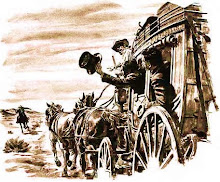Friday, November 20, 2009
But He Didn't Fire the FATAL Shot
For some reason, the Pardon Board, and of course the Houston Chronicle wanted Governor Rick Perry to spare the life of Robert Lee Thompson. Thompson and another man were on a robbing spree back in 1996 in Houston. They robbed a store in which two clerks were shot, one fatally. The other man fired the fatal shot, but for some reason the jury couldn't be convinced that the robber intended to kill the clerk when he fired at him. The article states that the prosecution failed to prove the element of intent. I guess nobody heard of the element of knowing. Anyhow, the article harps on the fact that Thompson didn't fire the fatal shot. I guess as long as he didn't actually kill the clerk that Thompson doesn't deserve the death penalty. Even though he shot the other clerk four times and tried to shoot him again in the neck but he was out of ammunition. I guess that kind of person doesn't deserve the death penalty in the eyes of the Chronicle. The article also says that Thompson and his buddy targeted stores that Thompson felt "were exploitative of blacks." That means Thompson targeted stores ran by immigrants so shouldn't that be a hate crime? Yet, he didn't fire the actual fatal shot so the Chronicle and the board of pardons (for some odd reason) felt this worthless piece of trash should be spared.
Subscribe to:
Post Comments (Atom)




5 comments:
This comment is late but I think I should make it.
If you are going to talk about facts of a crime, get them straight.
I was Mr. Thompson's state habeas lawyer and I am familiar with the facts of the crime.
Mr. Thompson and his accomplice were robbing a store where there were two clerks. Yes, Mr. Thompson shot the clerk at the front of the store. May have intended to kill him. But that man did not die. At that point, Mr. Thompson was guilty of attempted capital murder.
However, as he and his accomplice were trying to flee, the second clerk ran out of the store. The accomplice fired from the getaway car and struck that clerk, killing him.
The jury at the accomplice's trial believed that there was no intent to kill. So, the triggerman was sentenced to life for murder. He'll be eligible to parole soon.
It appears that you do not understand the law of capital murder for robbery-murders. It has been the law since 1974 that to be a capital murder, there must be the intent to kill. Not shoot, not wound, not maim but to kill.
This is different from the lesser offense of murder, where a person can be convicted for intentionally or knowingly shooting someone.
In regular murder, the focus of the intent is on the intent to do an act. In capital murder, it is on the intent to cause the result.
If you're going to write about the law, the least you could do is get your law and your facts straight.
Happy Spring :)!
xo
Lee Ann
Hi Tom: The fact remains that an animal went to jail instead of being fried. It may be on technicality but it still reeks of stupid
Personal Injury Attorneys Medford
Hi Tom: The fact remains that an animal went to jail instead of being fried. It may be on technicality but it still reeks of stupid
Personal Injury Attorneys Medford
Hey Tom, two points:
1) You may want to reread the "law of parties" and the "felony murder doctrine!"
2) Forget you're a lawyer for a moment. Your client decided to participate in an event that resulted in the death of an innocent man. Doesn't that matter?
Post a Comment